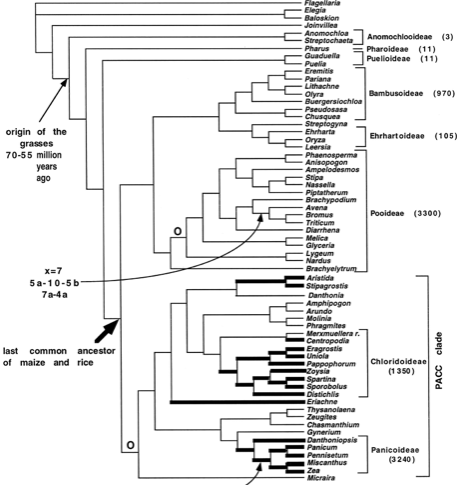71.5 – 67.7 million years ago
Not as dramatic as the evolution of Triceratops or T. rex, but of more lasting consequence, is the evolution of grasses (Poaceae). We know from coprolites – fossil feces — that grass was around by the Late Cretaceous, so the coevolution of grass and grazers had already begun with dinosaurs. These early grasses were not widespread. It would take climate shifts and more evolution (toward using carbon dioxide more efficiently) to create the sort of grasslands we are familiar with.

Grasses have played a central role in human evolution and human history. Human beings evolved in tropical grasslands, and some evolutionary psychologists think we still have an instinctive affinity for this environment. The domestication of grasses (wheat, barley, oats, millet, rice, corn) was one of the great revolutions in human prehistory, and grasses provided most of the calories people ate for most of recorded history. Contact along the frontier between grasslands supporting pastoralists and grain growing lands supporting peasants is one of the great engines of historical dynamics.
Grasses grow from the base of the leaf, not the tip of the stem, which is what allows them to recover from being grazed. This makes them a recurring symbol both of the transitoriness of life (“All flesh is grass, and all the goodliness thereof is like the flower of the field,” Isaiah 40:6) and its resilience.
Brahms used another verse about grass in the second movement of his German Requiem “For all flesh is as grass, and all the glory of man as the flower of grass. The grass withereth, and the flower thereof falleth away,” 1 Peter1:24. (Here is the German text and English translation.)
And the most famous poem about grass, by Walt Whitman, perhaps strikes the right elegiac note for the dinosaurs, who meet their doom tomorrow:
A child said, What is the grass? fetching it to me
with full hands;
How could I answer the child?. . . .I do not know what it
is any more than he.
I guess it must be the flag of my disposition, out of hopeful
green stuff woven.
Or I guess it is the handkerchief of the Lord,
A scented gift and remembrancer designedly dropped,
Bearing the owner’s name someway in the corners, that we
may see and remark, and say Whose?
Or I guess the grass is itself a child. . . .the produced babe
of the vegetation.
Or I guess it is a uniform hieroglyphic,
And it means, Sprouting alike in broad zones and narrow
zones,
Growing among black folks as among white,
Kanuck, Tuckahoe, Congressman, Cuff, I give them the
same, I receive them the same.
And now it seems to me the beautiful uncut hair of graves.
Tenderly will I use you curling grass,
It may be you transpire from the breasts of young men,
It may be if I had known them I would have loved them;
It may be you are from old people and from women, and
from offspring taken soon out of their mother’s laps,
And here you are the mother’s laps.
This grass is very dark to be from the white heads of old
mothers,
Darker than the colorless beards of old men,
Dark to come from under the faint red roofs of mouths.
O I perceive after all so many uttering tongues!
And I perceive they do not come from the roofs of mouths
for nothing.
I wish I could translate the hints about the dead young men
and women,
And the hints about old men and mothers, and the offspring
taken soon out of their laps.
What do you think has become of the young and old men?
What do you think has become of the women and
children?
They are alive and well somewhere;
The smallest sprouts show there is really no death,
And if ever there was it led forward life, and does not wait
at the end to arrest it,
And ceased the moment life appeared.
All goes onward and outward. . . .and nothing collapses,
And to die is different from what any one supposed, and
luckier.
